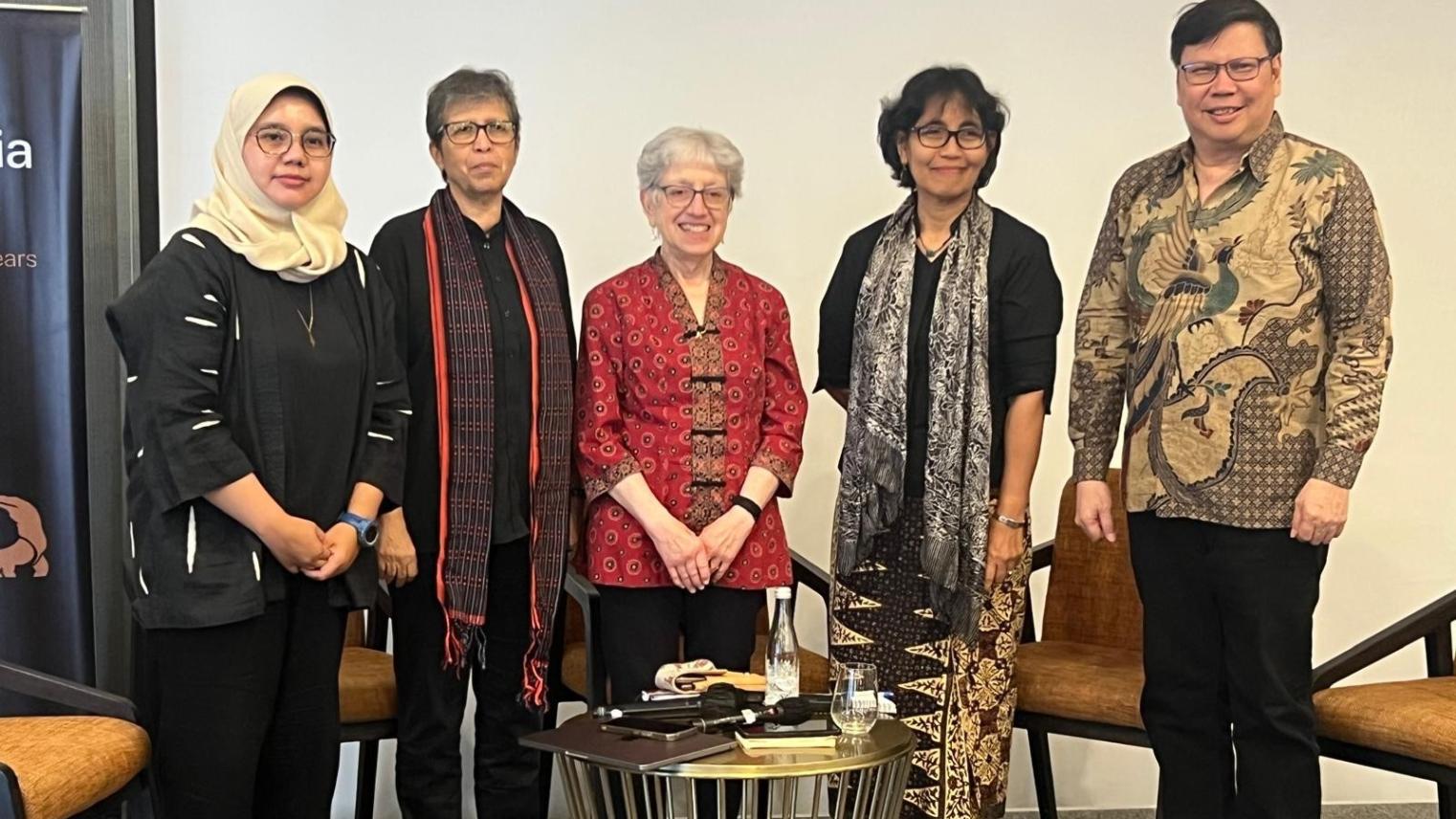Highlights from the 19th Sadli Lecture and Symposium on Social Inequality, Communities and Climate Change

The event, organised by the ANU Indonesia Project, LPEM FEB Universitas Indonesia, and KONEKSI, provided a platform for an interdisciplinary dialogue on critical issues surrounding gender, climate change, and social inequality in Indonesia.
The 19th Sadli Lecture: Colonial Legacies and Gender’s Role in Climate Change
The day commenced with the prestigious Sadli Lecture, titled “Colonial Legacies and Postcolonial Agendas: How Does the Indonesian Gender Order Move into a Postcolonial Future to Address Climate Change?”. The lecture was delivered by Professor Ann R. Tickamyer, Professor Emerita of Rural Sociology and Demography at Penn State University. Professor Tickamyer’s lecture explored the ongoing influence of colonial history on gender roles in Indonesia and its implications for contemporary approaches to climate resilience and disaster recovery.
Professor Tickamyer emphasized the enduring legacy of economic exploitation and gender norms established during colonial rule. She noted that the Dutch colonial administration’s resource extraction and plantation economy relied heavily on forced local labor, a system that entrenched gender hierarchies and contributed to long-lasting social inequalities. Despite Indonesia’s postcolonial status, these gendered inequities persist, restricting women’s access to resources and opportunities, particularly in relation to climate change adaptation.
The lecture also presented transformative resilience strategies, drawing on lessons from historical disaster recovery efforts. These ideas were further explored in a panel discussion moderated by Dr. Milda Irhamni of LPEM FEB UI, with contributions from Dr. Suraya Afiff (Faculty of Social and Political Sciences UI), Dr. Turro Wongkaren (FEB UI), and Professor Damayanti Buchori (IPB University). Following the discussion, a dynamic Q&A session allowed attendees to engage with the speaker and panellists on the intersection of gender, climate change, and disaster resilience in Indonesia. A commissioned paper from the Sadli Lecture will be published in the Bulletin of Indonesian Economic Studies (BIES) later this year, offering further insights into these critical issues.
Symposium on Social Inequality, Communities, and Climate Change
In the afternoon, the symposium delved deeper into the intersection of GEDSI and climate change, focusing on how these issues uniquely affect different communities across Indonesia. The event served as a platform for KONEKSI grantees to present their research, fostering a peer exchange of ideas and expert feedback.
The symposium was opened by Leonardo Adypurnama Alias Teguh Sambodo, Deputy Minister for Food, Natural Resources, and the Environment at Bappenas, who emphasized the importance of adopting a social inclusion approach to addressing climate change in Indonesia.
Session 1 featured presentations by Dr. Aplena Elen Siane Bless (Universitas Papua), Dr. Daniel M.Sc (Universitas Gadjah Mada), and Idha Apriliani (Universitas Diponegoro). Topics discussed included indigenous Papuan women’s conservation strategies, climate-resilient rural water supply systems, and socio-ecological pathways for climate change adaptation. The presentations sparked a series of dynamic discussions that illuminated how gender, indigenous knowledge, and social inequality intersect to shape responses to climate change in various Indonesian contexts.
Session 2 featured presentations by Dr. Lilis Mulyani (BRIN) and Agus Suntoro (BRIN), focused on the role of social forestry management in promoting climate resilience and the impacts of forced labor on women and children in the context of climate change. This session highlighted innovative approaches to addressing both social and environmental challenges through research and collaboration, underscoring the need for integrated solutions to complex problems.
The symposium concluded with closing remarks from Ria Arief, Unit Manager of the Knowledge to Policy Unit, DFAT who reaffirmed the importance of continued interdisciplinary dialogue and research in addressing Indonesia’s climate and social challenges. The event’s discussions provided valuable insights into the ongoing efforts to incorporate social equity into climate change policies and practices, underscoring the need for inclusive approaches to sustainability and resilience.
Image, from left to right: Dr. Milda Irhamni, Dr. Suraya Afiff, Professor Ann R. Tickamyer, Professor Damayanti Buchori and Dr. Turro Wongkaren